Mortgage rates are low, workplaces are more flexible, and everyone wants more space while stuck at home. Needless to say, in many markets, especially the suburbs, the housing market is on fire. Adding even more fuel to this proverbial fire, those millennials that have been delaying their American Dream of homeownership are finally getting their opportunity.
If you’re one of the many people currently and considering house hunting, there are SO many resources easily available to you. While this is a gift in many ways, it can also be a curse if your sources aren’t accurate or user-friendly resources.
To help guide your house-hunting adventure, we are going to review Zillow, Realtor.com, and Redfin and provide our opinion on the reasons to use or avoid each. For the sake of this comparison, we looked at the same property across each platform. We also used the Multiple Listing Service (MLS), a database available to realtors where all the official specs of a housing posting can be found. Let’s discover together which is the best website for house hunting.
What do they all have in common?
While there are some key differences between these websites that we will cover on an individual basis, they are very similar in a lot of ways. So let’s start there.
House Description
All three websites provided an overview of the house, as written by the seller agent, that matched what was on the MLS. This description usually includes language designed to paint the house in the best light, brag about any upgrades, and entice a buyer. This is only as good as the selling agent’s creativity.
Basic Housing Specifications
All three do a good job of immediately telling you the below data points, important to initial filtering:
- Asking price, square footage, and price/square foot calculation
- As many pictures as the seller’s agent includes
- The type of home (Single Family Residence, Townhome, or Condo)
- Bedroom and bathroom count
- What year the home was originally built
- Homeowner Association fees – aka HOAs (although not equally correct as we will show below)
- Property history outlining when it was put on the market and changed ownership over the life of the home
Neighborhood Details
- Local school names and ratings
- Interactive map
- Provide comps for similar homes
- Comparables, or comps, are what realtors use to decide how to competitively price houses they are selling and can be used by buyers to inform their negotiation.
Decision-Making Tools
- Monthly cost calculators that can be edited to apply various scenarios
- Mortgage pre-approval tools
- The websites make money by partnering with lenders to advertise and drive business to the lenders. There is also the benefit to homebuyers of identifying possible lenders all in one place. However, be sure to shop around for the best mortgage rate and terms.
- Set up a showing or contact an agent
- This is also a way the websites make money, by selling lead-lists to local realtors and being the middle-man between buyers and agents.
Learning Resources
All three sites have tons of free resources that will help educate you on the housing transaction process. This is a great place to start your homebuying journey.
Personal Account Benefits
They all allow you to create a personalized account to better enhance your user experience and help you with your home search. Below are a few of the benefits they all provide:
- Saving searches and your favorite homes helps the websites’ algorithms make better suggestions and provide a place for you to revisit homes you liked
- By remembering your preferences, they can better remember a mortgage rate you have been quoted or how much money you’re likely to put down
- Once you create an account and begin searching, get ready for them to send you emails…lots of emails! They will often send emails about communities you’ve searched, homes that are similar to ones you’ve liked or you can preset certain parameters. There is a good chance you will need to go in and unsubscribe from some of them to avoid cluttering your inbox.
SLIGHTLY EDUCATIONAL Review
We outlined the similarities above, and now, we’ll share our personal review of the pros and cons of Zillow vs. Realtor.com vs. Redfin so you know where to get started.
Zillow
Zillow is the most common and widely-referenced housing website. They have done a great job of creating a user-friendly experience that has made it easier for house hunters to narrow in on the type of homes and communities that they want to live in.
Cheat Sheet
- Using their deep database of housing prices across almost every community, they provide you a Zestimate (or Zillow estimate) for what they believe a fair price should be. This is a helpful tool for those that are not real estate professionals to quickly decipher if a home is over- or under-priced.
- Zillow does a good job of providing an easy-to-find list that highlights the details of the property you won’t find in the description.
- Zillow’s monthly cost calculator is really easy to use and edit. This is great and we were using it a lot until realizing that they did a poor job of accurately pulling in the HOAs and property taxes for the houses we were looking at. This had huge implications when we were deciding the affordability of each home.
- They send too many emails that it is often overwhelming. Be ready to unsubscribe often.
Standout Feature
One of my favorite features of Zillow is how they tell you how the housing prices in the same community have increased or declined over the past year and their predictions for the following year. This is helpful when considering the property as an investment.
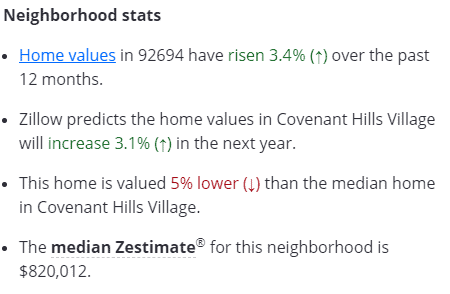
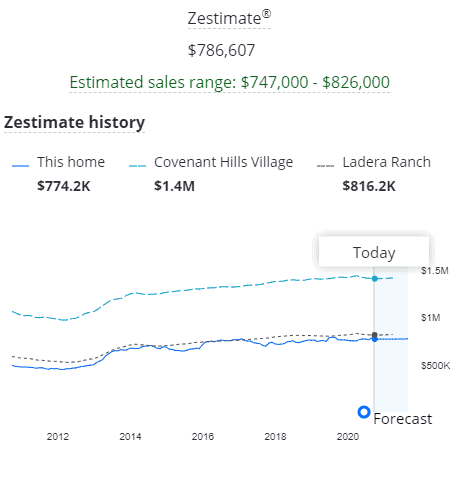
Professor’s Grade: B-
Realtor.com
More than the rest, Realtor.com really focuses on outlining the community and micro-trends related to the house you’re searching for. Realtor.com also has all the features you will see on Zillow and excels across some of the below features.
Cheat Sheet
- Just put in your current address, your new address, and how much stuff you own, and Realtor.com’s moving calculator will estimate the cost of hiring movers and provide referrals. This is a simple and thoughtful tool that helps alleviate some of the moving stress.
- Realtor.com excels in clearly displaying local comps highlighting similar home values and neighborhood housing trends.
- Realtor.com does not compile all the property details in one easy-to-read section like Redfin does. You will still find a lot of information about the property, just at a shallower level.
Standout Feature
An interactive map allows you to overlay crime, noise, flood, and traffic statistics as well as show where local shopping and school options are located. This feature is far more advanced than any of the map overlays seen on other sites. This just adds to Realtor.com’s focus on giving the buyer a good sense of the local community.
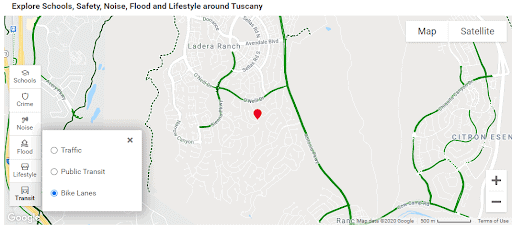
Realtor.com Transit Map 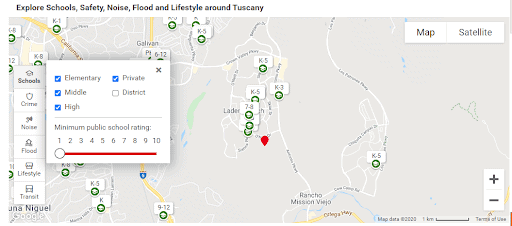
Realtor.com Local Schools Map 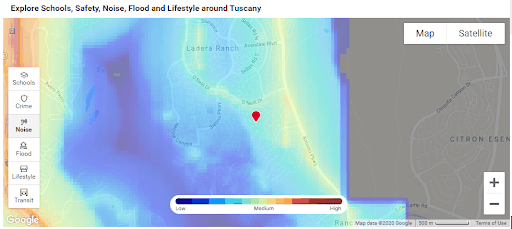
Realtor.com Noise Map 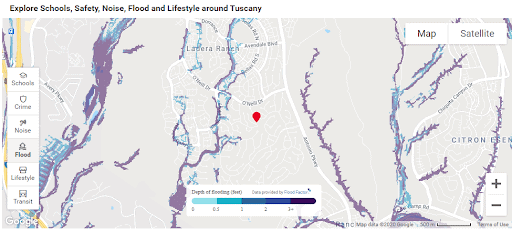
Realtor.com Flood Map
Professor Grade: A-
Redfin
As we outlined at the beginning, there are a lot of commonalities between all of these sites. Redfin has all of the basic functionality as Zillow with a few improvements.
Cheat Sheet
- Their easy-to-find property detail section is simple to navigate and lays everything you would need to know about the property out in one space.
- Similar to a Zestimate, Redfin provides a value estimate based on their market knowledge and boringly name it Redfin Estimate.
- Redfin excels where Zillow fails when it comes to accurately pulling in estimated costs. Their calculators account for all HOAs and accurate property taxes.
- There is a section that outlines the activity from potential buyers which is really helpful in a hot real estate market and could help with your negotiating stance.
- There is also a calculator that will tell you how much you can sell your current house for and apply towards a new home. All you do is type in your address and your outstanding mortgage and it will value your home based on its database.
Standout Feature
The “How much house can I afford” calculator is a great tool for those who are new to their home search. You input your household income, debt, and where you want to live and Redfin will help you determine the purchase price and associated risk level (see below).
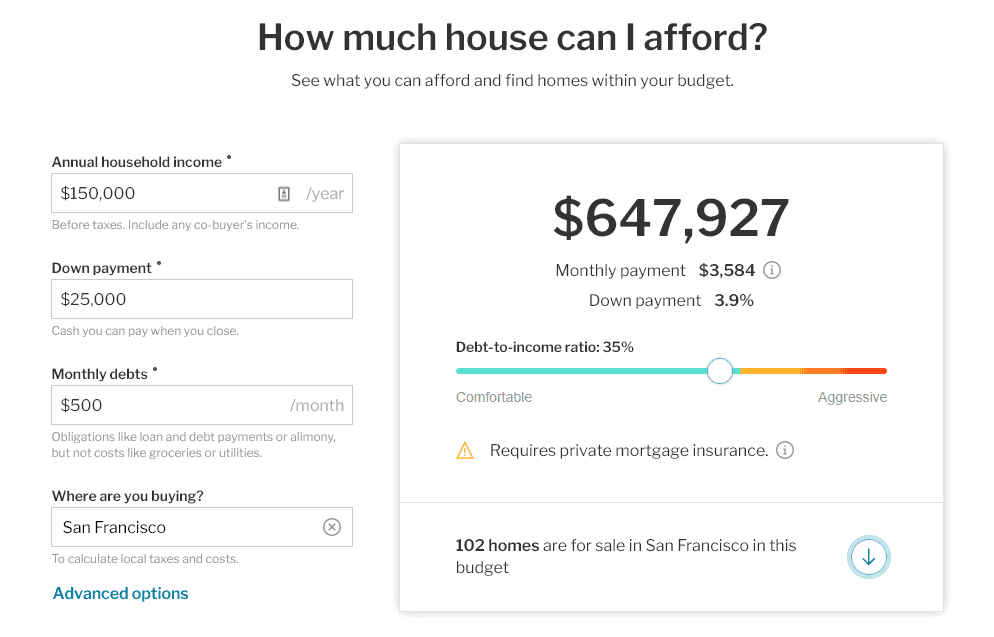
Professor Grade: A
Get a real estate agent
At the end of the day, all of these websites are great resources to learn about different communities, narrow down the type of home you want, and help you determine how much home you can afford. But, ALWAYS hire a local realtor to help you when buying. These websites can not effectively communicate the nuances of a community or type of home that an experienced realtor can. Realtors will better be able to evaluate a home, help you navigate the mortgage process, and determine what inspections need to be done. Good realtors will help you find the perfect home and get you the best price.
As a buyer, there is no disadvantage of having a realtor because their commission is paid out of the purchase price from the selling agent. At the end of the day, you are getting an excellent resource for free.
How Do I Get Started?
Now that you know how to best identify your next home, dive into our Beginner’s Guide for Homebuying. SLIGHTLY EDUCATIONAL has a ton of other great homebuying resources, such as our Property Type Primer and Starter Home vs. Dream Home.
Check out additional topics to make personal finance SLIGHTLY EDUCATIONAL on our Personal Finance page.



